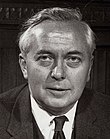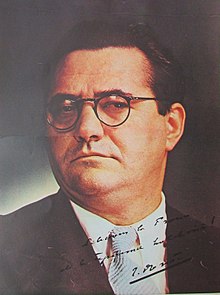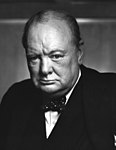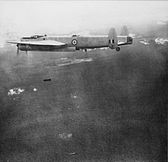User:CTWarboss/sandbox
No Thatcher
[edit]| Portrait | Prime minister Office (Lifespan)
|
Term of office | Mandate[a] | Ministerial offices held as prime minister | Party | Government | Monarch Reign
| |||
|---|---|---|---|---|---|---|---|---|---|---|
| Start | End | Duration | ||||||||
| | 
|
[1]
|
16 October 1964
|
6 April 1976
|
11 years, 173 days | 1964 | Labour | Wilson I | Elizabeth II r. 1952–2022
| |
| 1966 | Wilson II | |||||||||
| 1970 | Wilson III | |||||||||
| 1974 | Wilson-Thorpe | |||||||||

|
[2]
|
6 April 1976
|
8 October 1979
|
3 years, 183 days | — | Labour | Jenkins-Steel | |||

|
[3]
|
8 October 1979
|
28 June 1989
|
9 years, 264 days | 1979 | Conservative | Howe I | |||
| 1983 | Howe II | |||||||||
| 1987 | Howe III | |||||||||
Pierced Wings
[edit]1947 United Kingdom general election
[edit]
| |||||||||||||||||||||||||||||||||||||||||||||||||
All 730 seats in the House of Commons 365 seats needed for a majority | |||||||||||||||||||||||||||||||||||||||||||||||||
|---|---|---|---|---|---|---|---|---|---|---|---|---|---|---|---|---|---|---|---|---|---|---|---|---|---|---|---|---|---|---|---|---|---|---|---|---|---|---|---|---|---|---|---|---|---|---|---|---|---|
| Opinion polls | |||||||||||||||||||||||||||||||||||||||||||||||||
| Turnout | 74.3% ( | ||||||||||||||||||||||||||||||||||||||||||||||||
| |||||||||||||||||||||||||||||||||||||||||||||||||
 Colours denote the winning party | |||||||||||||||||||||||||||||||||||||||||||||||||
 Composition of the House of Commons after the election | |||||||||||||||||||||||||||||||||||||||||||||||||
| |||||||||||||||||||||||||||||||||||||||||||||||||
The 1947 United Kingdom general election was a national election held on Thursday 14 August 1947. The governing National Party sought to maintain its position in Parliament, but faced large questions about their ability to govern due to their leadership during the Second Great War, as well as party fatigue due to being in government since the 1930 general election. Prime Minister Winston Churchill proposed to call for an election less than two months after Victory in America Day.
The election campaign was focused on who would steer the British Empire through the post-war period, with the split of Europe between the French State and Soviet Union and beginning of the Cold War. Churchill and the Nationals sought to use his popularity due to the Square Deal he had introduced pre-war, as well as the Empire's victory over the Columbian Republic in America. However, Churchill faced questions over his government's conduct on the European Front, which saw the Grand Alliance soundly defeated and Germany split between the French State and Prussia. Clement Attlee, leader of the Labour Party, had served as Deputy Prime Minister during the wartime coalition and was seen as a more competent leader by voters due to his successful management of the domestic economy during the war. When the election was called, opinion polls had Labour firmly in first place, but Churchill's popularity remaining high.
The final result of the election showed Labour to have won a landslide victory, making a net gain of 275 seats, winning 43.3% of the popular vote and a majority of 101 seats, making Attlee the first Labour Prime Minister. This election marked the first time Labour had won a general election, and enabled Attlee to begin implementing Labour's post-war reforms in the country. For the Nationals, Attlee's landslide was a shock, as polls indicated the result would be closer. The Nationals suffered a net loss of 228 seats, almost half of those they had won in 1935, and also only won 35.7% of the vote, a decrease of 13.2 percentage points. For the Reconstituted Tory Party, the election continued their fall into irrelevancy, losing 38 seats. This was mainly due to vote splitting from the Unionist Party, a party which had split from the RTP during the war. Over 300 new MPs were elected, marking a record turnover.
The 11.1% swing from the Nationals to an opposition party remains the second-largest since the Acts of Union 1800, beaten only by the 12.2% swing in the 1930 general election. Additionally, this was the first election in which the Nationals did not win a plurality of the popular vote since the removal of the "guaranteed majority" rule in 1930. Following the election, Churchill resigned as National Party leader, being replaced by Ernest Brown.
| Malayan Revolution Revolusi Malaya 馬來亞革命 மலாயா புரட்சி | |||||||
|---|---|---|---|---|---|---|---|
| Part of the Asian Revolutions and Cold War in Asia | |||||||
| |||||||
| |||||||
| Belligerents | |||||||
|
British Commonwealth forces: |
Communist forces: (1950-1955) | ||||||
| Commanders and leaders | |||||||
|
|
| ||||||
| Strength | |||||||
|
Over 398,000 troops
|
Over 340,000 troops
| ||||||
| Casualties and losses | |||||||
|
|
46,710 killed 2,478 executed 58,289 wounded | ||||||
|
Civilians killed: 58,284 Civilians missing: 3,810 Civilian casualties: 52,000+ Total killed: 61,107 | |||||||
| Cuban War | |||||||||
|---|---|---|---|---|---|---|---|---|---|
| Part of the Cold War in America | |||||||||
| |||||||||
| |||||||||
| Belligerents | |||||||||
|
| ||||||||
| Commanders and leaders | |||||||||
| Strength | |||||||||
|
≈232,000(1956)
|
≈187,000 (1968) | ||||||||
| Casualties and losses | |||||||||
Total military dead/missing: |
| ||||||||
| |||||||||
- ^ Eccleshall & Walker 2002, p. 333; Englefield, Seaton & White 1995, pp. 313–320.
- ^ Eccleshall & Walker 2002, p. 350; Englefield, Seaton & White 1995, pp. 331–333; UK Parliament 2005b.
- ^ Eccleshall & Walker 2002, p. 358; Englefield, Seaton & White 1995, pp. 340–347; UK Parliament 2013.
Early PW Cold War conflicts
[edit]| German Resistance | |||||||
|---|---|---|---|---|---|---|---|
| Part of Resistance to French occupation and the Cold War in Europe | |||||||
 French milice and resisters, July 1974 | |||||||
| |||||||
| Belligerents | |||||||
|
| ||||||
| Units involved | |||||||
| Strength | |||||||
|
≈3,122,000(1982)
|
≈4,037,000(1982)
| ||||||
| Casualties and losses | |||||||
Total military dead/missing: |
Total military dead/missing: | ||||||
| |||||||
Leader infoboxes
[edit]Jacques Doriot | |
|---|---|
 Doriot in 1941 | |
| 1st Consul of the French State | |
| In office 26 October 1931 – 5 April 1982 | |
| Preceded by | Office established |
| Succeeded by | Jean-François Galvaire |
| Personal details | |
| Born | 26 September 1898 Bresles, Oise, France |
| Died | 5 April 1982 (aged 83) Paris, France |
| Resting place | Saint-Denis, Seine-Saint-Denis |
| Political party | Romanist Party of France (1923–) |
| Occupation | Politician |
| Civilian awards | Full list |
| Military service | |
| Branch/service | |
| Years of service | 1916–1917 |
| Rank | Corporal |
| Unit | |
| Battles/wars | |
| Military awards | Full list |












